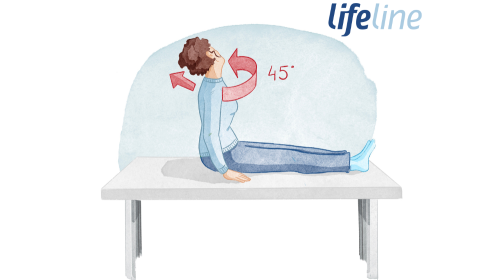Suddenly everything sways or rotates: dizziness is often caused by a harmless disorder in the inner ear. But it can also be a symptom of various underlying diseases and become chronic. Which causes are possible and what those affected can do if they experience dizziness!
Quick overview: Frequently asked questions and answers
Why dizziness when you have a cold or COVID-19? Upper respiratory tract infections can cause circulatory problems and mild dizziness. If dizziness persists, there may be inflammation in the middle or inner ear. Even after a corona infection, some affected people report symptoms such as dizziness, shortness of breath or problems concentrating.
Why does dizziness occur when lying down? Dizziness when lying down can be caused, for example, by blood pressure problems, diseases of the inner ear, taking certain medications or excessive consumption of alcohol.
What helps with dizziness? In acute cases, it is best to sit or lie down to avoid a fall. It usually helps to fixate on a fixed point in order to be able to orient yourself again. Frequent attacks of dizziness should be checked by a doctor.
Article content at a glance:
What is dizziness?
Dizziness, medically known as vertigo, is a disorder of the sense of balance. Those affected lose orientation in space and their physical security. Dizziness attacks can last a few seconds, minutes or hours and are sometimes accompanied by other symptoms such as nausea.
Vertigo is not an independent disease, but a symptom of many underlying diseases. For some people, dizziness attacks always occur in very specific situations or after movements, but they can also occur without an identifiable trigger.
The likelihood of experiencing dizzy spells increases with age. In young adults, dizziness is only the reason for a visit to the family doctor in around 2 percent of cases. This proportion rises to more than 30 percent for people over 65 years of age. This is due to natural aging processes: for example, the sensory performance of the balance organs decreases. Age-typical illnesses and side effects of medications also play a role.
The most common types of dizziness at a glance
There are several forms of dizziness. The individual types of dizziness not only feel different to those affected, but also have different causes. The best known and most common forms of dizziness include:
Positional vertigo: The most common is benign positional vertigo. It usually occurs after rapid head movements such as standing up or bending down and usually only lasts a few seconds. Those affected feel as if everything revolves around them.
Vertigo: Those affected have the feeling that they themselves or the environment are wavering. This form of dizziness can be caused by both muscle tension and psychological factors. In the second case, experts also speak of psychogenic or phobic vertigo, which is often associated with anxiety disorders.
Meniere’s disease: When vertigo suddenly occurs, those affected feel like they are on a carousel ride. The form of vertigo is associated with one-sided hearing loss, tinnitus, nausea and an increased tendency to fall.
Lift vertigo: Patients experience lift vertigo as if they were being lifted or sinking. Therefore, this form of dizziness can lead to unsteady gait and severe dizziness, which increases the risk of falls.
Dizziness when lying down, standing up or bending over
Dizziness can feel different and occur in different situations, such as:
- laying,
- while getting up,
- when bending over,
- with rapid head movements,
- after eating,
- while driving or
- in the cinema.
Dizziness is also not uncommon during pregnancy.
The time when dizziness occurs is of central importance for the medical diagnosis. However, clear triggers are not always identifiable.
What causes dizziness?
The causes of impaired sense of orientation can be varied. These include, among others:
Organic disorders
Diseases of the inner ear (such as Menière’s disease)
Inflammation of the vestibular nerve, which can lead to dysfunction of the vestibular system (vestibular neuritis)
Damage to the cerebellum or brain stem as a result of circulatory disorders (arteriosclerosis, stroke)
Tumors, such as a benign tumor on the vestibular nerve (acoustic neuroma)
Underlying diseases that can be accompanied by dizziness
Dizziness can also occur with a high fever or changes in pressure, for example when traveling by plane or diving. Muscular tension or problems with the cervical spine or jaw joints are often responsible for feelings of dizziness.
When should you get dizziness checked by a doctor?
If slight dizziness only occurs every now and then, disappears quickly and is not accompanied by any accompanying symptoms, this is usually not a cause for concern. However, if dizziness occurs frequently and over a longer period of time, the symptoms should be clarified by a doctor.
In principle, it is always advisable to seek medical advice if:
Those affected have the feeling that the dizziness is unusually frequent, severe or long-lasting or
the dizziness attacks are accompanied by other symptoms such as nausea, vomiting, headache, drowsiness, anxiety or shortness of breath.
Diagnosis of dizziness
If you are looking for medical support for dizziness, you should first contact your family doctor. During the conversation, the doctor receives important information about possible causes of the dizziness symptoms. Of particular interest are the type, frequency, form of dizziness and current or previous illnesses.
Provide further information:
- Tests to check coordination skills,
- Examinations of the function of the heart and circulatory system as well
- an examination of the ears, the musculoskeletal system and the nerve functions.
Depending on the prevailing symptoms, a referral to special medical specialists can be made. This can be a neurologist or an ear, nose and throat doctor.
If disorders of blood pressure regulation or cardiac arrhythmias need to be ruled out, the department of internal medicine is responsible. In some cases, an ophthalmological, orthopedic or psychiatric examination may also be useful. The type and extent of diagnostic measures depend on the suspected cause of the dizziness.
The right therapy for dizziness
The type of treatment depends on the cause of the dizziness:
There are special medications (so-called antivertiginosa) that can be used for particularly severe attacks of dizziness, especially in Menière’s disease.
If there is hyperexcitability of the inner ear or the vestibular nerves, antiepileptic drugs are sometimes used. Sometimes blood circulation-stimulating agents or corticosteroids are also indicated.
If there are tumors or vascular problems, surgery may be necessary.
In the case of psychogenic staggering vertigo, psychotherapeutic measures are usually an option.
Some sufferers also benefit from physiotherapy. With the help of special exercises, for example, leg strength and mobility can be improved and the risk of falling can be reduced.
For benign positional vertigo, positioning training is the main focus of therapy. Certain exercises such as the Epley maneuver are performed repeatedly to move deposits in the inner ear to an area where they can no longer irritate the sensory cells.
Can dizziness be prevented?
The positive design of some lifestyle factors helps to keep the blood vessels, metabolism and psyche healthy, which can prevent attacks of dizziness. These factors already create important prerequisites for a healthy balance without dizziness:
exercise regularly and sufficiently
Avoid excessive consumption of alcohol and nicotine
reduce stress-causing factors (physical and psychological)
Eat balanced and regularly to avoid hypoglycemia
sleep enough
drink enough
Background information: Disturbed balance system due to dizziness
Dizziness occurs due to a disturbance in the sense of balance. This enables people to perceive their body movements and maintain spatial orientation.
Vestibular system
The balance organ (vestibular organ) in the inner ear plays a central role. It consists of three semicircular canals filled with lymph fluid that open into a bulge (ampule). This is lined with sensory cells with microscopic hairs. When you move your head, the fluid also moves, which irritates the sensory cells in the inner ear. This triggers the information to be passed on to the brain.
The balance organ also includes two atrial sacs. These inform the brain when the body moves forward, backward, sideways, up or down.
Optical and proprioceptive system
The eyes and receptors in joints and muscles are also involved in the sense of balance. All of these elements provide the brain with the necessary information to provide information about spatial position. If there is a disruption in the transmission or processing of information in this complex system or if contradictory information is transported, the ability to orientate is restricted. The result: dizziness occurs.


